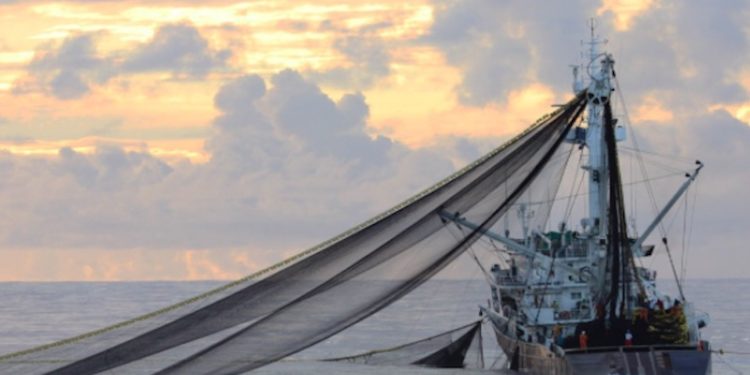The Spanish tuna fleet, acting jointly through OPAGAC, has begun the process to enable canned tuna distribution and processing companies to earn chain-of-custody certification from AENOR.
The Spanish tuna fleet is making headway on the promise it announced last October and is delivering on its commitment to roll out the first cans bearing the AENOR Atún de Pesca Responsible (APR) (Responsibly Fished Tuna) certificate, which are due to hit Spanish supermarket shelves before summer.
According to OPAGAC, when that happens, the fleet will have closed the circle on this project. What began with certifying the tuna business at sea under UNE 195006 will be completed with certification on land. Then the whole tuna canning process will be covered, from the ocean to the shopping basket. The new cans will carry the APR (RFT) AENOR Conformity certificate.
The first tuna canning companies will undergo their first AENOR certification audits in the next few weeks. AENOR certification is entirely voluntary; any tuna vessel and any canning company in the world can apply.
The new cans will make Spanish consumers the first in the world who can take home certified socially and environmentally sustainable canned tuna. The cans will carry the AENOR Conform label, and they will also display a QR code consumers can use to access a variety of information about the product, its origin and responsible food processing.
The fleet earned AENOR certification for its seagoing activity in July 2017. The Organización de Productores Asociados de Grandes Atuneros Congeladores (OPAGAC) is an organisation covering 47 vessels that fish for tropical tuna in the Indian, Pacific and Atlantic oceans for eight companies (Atunera Dularra, Calvo Pesca, Ugavi de Túnidos, Albacora, Compañía Europea de Túnidos, Nicra 7, Sant Yago and INPESCA).
‘No fishery has a future if it doesn’t work sustainably with the sea and deal responsibly with its employees and the economic and social development of its fishing zones,’ said Julio Morón, managing director of OPAGAC.
‘With this standard we’ve become the first fleet to certify this approach to responsible fishing, and we’re placing the decision to support it in the hands of consumers.’
What kind of consumer guarantee does AENOR certification provide?
The AENOR Conformity logo only goes on cans containing tuna from vessels certified under UNE 195006 for RFT (Responsibly Fished Tuna) and belonging to a comprehensive Fishery Improvement Project (FIP). The AENOR Conform RFT label is the result of a merger of the two voluntary initiatives the fleet has been engaged in since 2016.
The first initiative, FIP, which the fleet began in cooperation with the World Wildlife Fund, ensures that vessels and crews employ only the best environmental conservation practices in regard to species and the environment in the fishing zones where the fleet operates. This initiative involves close cooperation with governments and the fisheries organisations that manage each ocean’s various geographic fishing areas, which are known as regional fisheries organisations (RFOs).
The UNE Responsibly Fished Tuna standard certified by AENOR is a pioneer in itself. It is the first standard the world fishing industry has ever seen that guarantees, among other things, compliance with the working conditions established by the International Labour Organisation (ILO) in Convention 188, the Work in Fishing Convention. This certificate guarantees that the fish which distributors are marketing and consumers are eating has been caught by companies and vessels belonging to OPAGAC, and moreover it is backed by stringent social, labour and maritime safety standards high above what the law currently requires.
‘The AENOR Responsibly Fished Tuna certificate again guarantees that consumers are getting something good. The tuna fleet and the canning companies in OPAGAC have voluntarily undergone an examination administered by an independent third party and acknowledged by consumers. This is their way of publicly declaring their firm, long-term commitment to sustainability and social responsibility in the fishing industry, in tune with the values of today’s society,’ explained David Verano, Agrofood Industry and Distribution director at AENOR.
With this initiative OPAGAC, which is the first Spanish fleet to join the United Nations Global Compact, wants to help achieve the Sustainable Development Goals and Agenda 2030 by having a direct impact on the goals of decent work, responsible consumption, care for life below water, peace, justice and solid institutions, and partnership for the goals.









